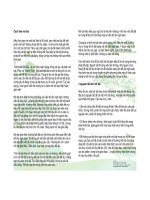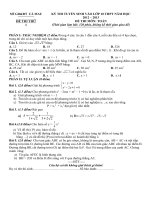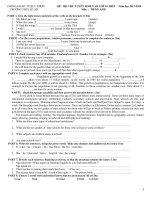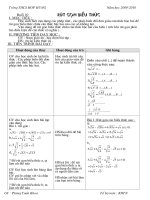tong hop BT on thi tuyen sinh lop 10
Bạn đang xem bản rút gọn của tài liệu. Xem và tải ngay bản đầy đủ của tài liệu tại đây (148.4 KB, 17 trang )
HOÀNG THỊ HỒNG NHUNG
Tp. Hồ Chí Minh – 9/2008
ĐỀ 01
I. Choose the best answers:
1. On (average/ holiday/ summer/ weekend), workers work eight hours a day.
2. The poor and the homeless children live in the (orphanage/ workhouse/ prison/ town).
3. They are (bored/ excited/ interesting/ willing) to watch their favorite programs on TV.
4. It’s necessary to (keep/ recycle/ preserve/ make) our waste for late use.
5. We’re happy to study with a teacher (who/whom/whose/which) teaching is excellent.
6. They always go to London in the summer (and/ because/ so/ although) they have some relatives
there.
7. There are many places of interest (in/ on/ for/ with) the city of London.
8. I think you should go (on/ with/ by/ to) train/
9. We were on a trip along the river (on/ in/ at/ about) the evening.
10. They have been interested in saving the environment (since/ for/ in/ during) a long time.
II. Word form:
1. You must be (care) _______________ when you open the door.
2. We should pay attention to (preserve) _______________ our environment.
3. The sun was shining (bright) _______________.
4. What role does the (cooperate) _______________ play?
5. His (collect) _______________ of stamps made us surprised.
6. They’re never been (bore) _______________ with their study.
III. Word form or correct tense:
1. They advised us (not go) _______________ out alone at night.
2. The children were excited about (open) _______________ their presents.
3. I wish you (be) _______________ here with us now.
4. She had her picture (take) _______________.
5. My brother (walk) _______________ down the street when it began to rain.
6. She (buy) _______________ some presents for the homeless children.
IV. Fill in each blank with a suitable word form the box:
Television has been very ____________ since it appeared a few decades ago. Millions of
____________ across the world are interested in watching TV programs almost ____________
day long every day. There are programs of all kinds to ____________ viewers of all ages, such as
cartoon for children ____________ movies for film lovers. People can also enjoy watching a
match at the Football Word Cup when ____________ is actually talking place.
So, it is not strange ____________ us to see why there is a TV set in every home today.
V. Complete the second sentence with the same meaning the first sentence:
1. I was too short to play basketball.
I was so ____________________________________________________________________
2. She started learning in this school 4 years ago.
She has ____________________________________________________________________
3. He didn’t hurry, so he missed the bus.
If he _______________________________________________________________________
4. He cleaned the window yesterday.
The window ________________________________________________________________
5. The children like to walk in the rain.
The children enjoy ___________________________________________________________
--------------------------------------------------------------------------------------------------------------------
ĐỂ 02
I. Choose the best answers:
1. Our class had a(n) (discussion/ impression/ saying/ speaking) about the importance of the
English language.
all live popular in it and for viewers attract
2. We can’t speak English as (good/ well/ better / best) as Linda.
3. Waste paper should be (recycle/ recycled/ recycling/ recyclable) to save money and labor.
4. There is a(n) (live/ alive/ lively/ life) music show on TV tonight after the weather forecast.
5. Millions of (watchers/ audience/ viewers/ spectators)
6. Canada is one of the largest (and/ but/ or/ although) richest countries in the world.
7. I was delighted to see her (in/ on/ for/ at) my party.
8. Thousands of people check in and out (in/ on/ for/ at) Tan Son Nhat Airport every day.
9. Drivers in London keep their cars (in/ on/ from/ to) the left side of the street?
10. Have you been satisfied with what you have (for/ since/ of/ with) you came here?
II. Word form:
1. It is (economy) _______________ to turn off the lights when it is bright enough.
2. He admired her for her (amaze) _______________ performance last night.
3. I got a (satisfy) _______________ result of the final examination.
4. The (preserve) _______________ of the environment is important.
5. Many (complete) _______________ were at the Games.
6. That boy did the test very (quick) _______________.
III. Word form or correct tense:
1. I (not finish) _______________ my work yesterday.
2. When the boy came, they (have) _______________ dinner.
3. They (live) _______________ in this house for at least 10 years.
4. She always (read) _______________ books in the evening.
5. We should have our teeth (check) _______________ every 6 moths.
6. She enjoys (walk) _______________ in the rain.
IV. Fill in each blank with a suitable word form the box:
It is Susan’s first ____________ to London. She arrived at Heathrow airport on a fine warm
day. She ____________ a taxi to the hotel in the downtown area. Susan was ____________
excited that she started her sightseeing tour right after ____________ in. What amazed her most
London was that people kept their cars to ____________ left in the streets. She visited a few
places of ____________ that afternoon.
The next day was a quiet day in London ____________ it was Sunday. Most shops were
closed and people got out of the city. Susan went ____________, too, and she really enjoyed the
beautiful sights in the countryside.
V. Complete the second sentence with the same meaning the first sentence:
1. I will ask someone to paint the house white.
I will have the house __________________________________________________________
2. The car was too expensive for her to buy.
The car was so ______________________________________________________________
3. If you do a lot of exercise, you will get healthy.
The more ___________________________________________________________________
4. He swims very fast.
He’s a _____________________________________________________________________
5. We can’t understand all the lessons.
We wish ___________________________________________________________________
--------------------------------------------------------------------------------------------------------------------
ĐỀ 03
I. Choose the best answers:
1. Having (company/ companies/ companion/ introduction) always makes people happy.
2. When a man and a woman are introduced, shaking hand is (up to/ depending on/ given by/ done
by) the woman.
3. I just want to drop (on/ in/ off/ out) to say good - buy to him before my trip abroad.
so the because took out trip checking away interest
4. Tom’s away on holiday. He (is gone/ has gone/ has been/ will go) to England.
5. Mary (use/ didn’t use/ was used/ had used) to work hard but she doesn’t now.
6. Why are these two schools so different (with/ in/ from/ between) each other?
7. She seemed to be successful (with/ in/ for/ on) anything she tired.
8. I could speak (a little/ little/ a few/ few) words of Swedish, but not very fluent.
9. She is fond of (collect/ collected/ collecting/ to collect) stamps from all over the word.
10. They paid a visit to the university in (which/ when/ where/ who) the Prime Minister used to
learn.
11. The teacher let his students (relax/ relaxing/ to relax/ relaxed) for a little before the short quiz.
12. They all do it (so to/ so as to/ in order to/ in other for/ in order) save the environment.
III. Fill in each bank with ONE suitable word:
HELP YOUR DOCTOR TO HELP YOU
The leading causes of death in many developing countries are now heart disease, cancer,
accidents, flu, pneumonia etc… Moreover, cigarettes, alcohol, physical inactivity ____________
overeating also add to the ______________ of several of these killing diseases. Medicine has little
help to offer, however, to persons who cannot get rid of habits harmful to ______________ health.
Surgery is the only means to offer any chance of survival for people ________________ lung
cancer.
Although psychiatrists try to stop people from drinking, they haven’t _______________ very
successful. _______________ have doctors. How then can our health be improved?
IV. Complete the second sentence with the same meaning the first sentence:
1. I don’t intend to apologize to either of them.
I have _____________________________________________________________________
2. My English friend finds using chopsticks difficult.
My English friend is __________________________________________________________
3. Surgeons have used the laser as accurate scalpels to treat cancers.
The laser ___________________________________________________________________
4. The gate is closed to stop the children running into the road.
The gate is closed so that ______________________________________________________
--------------------------------------------------------------------------------------------------------------------
ĐỀ 04
I. Give the correct tense or form of the verbs in brackets:
When Mr. Black (come) _______________ home from work yesterday, his wife (be) ______
busy in the kitchen. She was getting the dinner ready. He asked her what the children (do)_____.
She said they were both in the sitting room. They (watch) ____________ television. Mr. Black
was tired after his day’s work. He sat down, and while his wife (lay) __________ the table, he told
her what he (do) ___________ in the office.
II. Choose the best answers:
1. The day seems perfect (at/ in/ for/ of) a picnic.
2. He was sad (on/ about/ at/ of) his friend’s failure.
3. Please pay attention (to/ in/ on/ of) what I’m going to say.
4. Please go (on/from/ out/ over) your exercise before you hand it in.
5. The English drive on the (left/ right/ top/ bottom) hand side of the road.
6. Have you made a decision on the day (when/ which/ why/ where) you set off?
7. She locked the door (so not as to/ so as not to/ in order that/ not order to) be disturbed.
8. Do you mind (live/ to live/ living/ lived) on your own?
III. Word form:
1. The restaurant is now under new (manage) _______________.
2. John wanted to be (dependent) _______________ when he was 18.
3. You will (danger) _______________ your health if you smoke too much.
4. It is (convenience) _______________ to live in the neighborhood with plenty of shops.
5. Thousands of people have been made (home) _______________ by the war.
6. Some large cities have had measures to minimize air (pollute) _______________.
III. Choose the best answers:
Jack London’s life and writings are thought by many to represent the American love of
adventure. He (1) in San Francisco, California, and quit school (2) the United States, Europe, and
the Far East. (3) gold was discovered in Alaska in 1897, Jack London, (4) the call of adventure,
(5) part in the famous “gold rush”. His experiences in the wild northern country provided him (6)
material for (7) of his later stories and novels, including to Build A Fire. (8) his best – known
novels are The Call of the Wild and The Sea – Wolf.
1. a. born b. was born c. were born d. had born
2. a. in b. on c. at d. between
3. a. Where b. Which c. Who d. When
4. a. answer b. answered c. will answerd. answering
5. a. take b. took c. taken d. was taken
6. a. with b. between c. from d. together
7. a. much b. many c. any d. a lot of
8. a. Between b. Among c. In d. At
IV. Complete the second sentence with the same meaning the first sentence:
1. We hurried to the station in order not to miss the train.
We hurried to the station so that _________________________________________________
2. Tom is not in the habit of working in such a noisy factory.
Tom is not used _____________________________________________________________
3. We should not laugh at the invalid and the old.
We should not make __________________________________________________________
4. Mr. Smith was very unhappy because his business became bad.
If his business _______________________________________________________________
--------------------------------------------------------------------------------------------------------------------
ĐỀ 05
I. Put each verb in brackets in the correct tense:
a) It was a beautiful morning. The sun (shine) ____________. About 1,000 people (stand) _____
in front of the Palace. At 10:00, the guards (open) __________ the gates and the President’s car
(drive) ____________ out.
b) Last year (not be) ____________ a good year for Pete and Sonia. Pete (have) _____________ a
car accident and (spend) ____________ a month in hospital. The children (not pass) ________
________ their exam.
II. Choose the best answers:
1. There’s the house (which/ where/ that) Shakespeare was born.
2. What do you do often do (in/ on/ at) the inventing?
3. It is the English pronunciation (that/ who/ what) causes us a lot of difficulties.
4. The car was (too/ so/ such) expensive that I didn’t buy it.
5. Nam is (interest/ interesting/ interested) in being a Mathematics teacher.
6. I haven’t seen my brother (since/ for/ during) 5 months.
7. He was born (in/ on/ at) June 30
th
, 1994.
8. The scientist (which/ what/ who) discovered a new planet has won the Nobel.
III. Word form:
1. Gases from factories are extremely (harm) _______________.
2. We’ve decided to interview only six (apply) _______________ for the job.
3. The water is (pollute) _______________. You can’t drink it.
4. John drives very (care) _______________. He’s never had any accidents.
5. We all enjoy (learn) _______________ English.
6. In Britain the people who are out of work get (employ) _______________ benefit.
IV. Choose the best answers:
My first visit to the cinema (is/ was/ been/ will be) a very unhappy one. I (take/ takes/ taken/
was taken) there by (some/ any/ many/ much) friends when I was only seven years old. At first
there (bright/ brought/ was bring/ have brought) lights and music and I felt quite happy. (When/
Where/ Which/ Who) the light went out, I felt afraid. Then I saw a train on the screen. The train
(come/ came/ was come/ was coming) towards me. I shouted out in fear and (get/ got/ gets/
getting) down under my seat. When my friends (what/ who/ which/ when) me, they started to
laugh. I felt ashamed and sat back in my seat. I was very glad when the film ended.
V. Complete the second sentence with the same meaning the first sentence:
1. People found these keys in the hall.
These keys _________________________________________________________________
2. Rex Center is a farmer. I bought his land.
Rex Center, whose ___________________________________________________________
3. If Tom studies hard, he won’t fail the exam.
Unless _____________________________________________________________________
4. The boy is too young to understand the problem.
The boy isn’t ________________________________________________________________
5. Lee talks to people more politely than Ben.
Ben _______________________________________________________________________
6. They will build a factory in this area.
A factory ___________________________________________________________________
7. No student in my class can run as fast as Jack.
Jack is _____________________________________________________________________
8. Mai can’t get the job because she doesn’t speak English well.
If _________________________________________________________________________
--------------------------------------------------------------------------------------------------------------------
ĐỀ 06
I. Put each verb in brackets in the correct tense:
Linda is from England, but she (live) ____________ in the United States. She (work) _______ for
a women’s magazine. She (start) ____________ writing articles many years ago. She (write)
____________ many articles. As a journalist, she has visited nearly every city in the world.
Recently, she (be) ____________ to a number of countries in Africa. Now she 6 (be) _________
on holiday in Italy. She (go) there three days ago. She says she (return) ____________ to the
United States next week.
II. Choose the best answers:
1. Isaac Newton died in 1727 (with/ in/ at/ on) the age of eighty – five.
2. I haven’t had any news of John (in/ before/ on/ since) 2003.
3. Her daughter is (fond/ amused/ interested/ bored) of collecting coins.
4. The house is (very/ too/ such/ so) small for us to live in.
5. Do you mind (live/ to live/ living/ lived) on your own?
6. It’s the English phrasal verbs (which/ that/ it/ they) puzzle me most.
7. This is the factory (where/ what/ when/ which) my father used to work.
8. You must leave now (unless/ if/ because/ or) you will be late for schools.
9. Boys and girls may behave (differ/ difference/ different/ differently) in this situation.
10. All of us were (surprise/ surprised/ surprising/ surprisingly) at her success.
11. He was the greatest (scientific/ scientifically/ science/ scientist) of the time.
12. Radium was (discover/ discovered/ discoverer/ discovery) by Marie Curie.
13. We should stop (polluting/ polluted/ pollution/ pollutant) our environment.
14. I don’t think that film is (bore/ bored/ boring/ boringly).
IV. Choose the best answers:
Isaac Newton is one (in/ of/ at/ on) the greatest men in the history of science. He (born/ bored/
was bore/ was boring) in a small village of Wool Thorpe in England (since/ for/ on/ in) 1642. His
father was a poor farmer. When the boy was fourteen, his father died. Newton left school and









